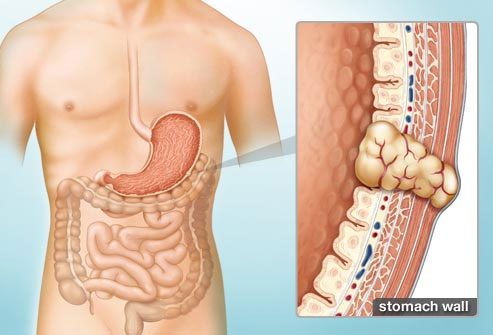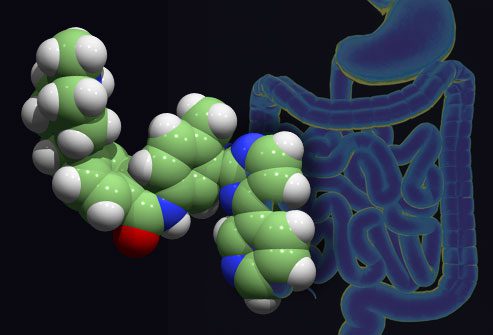Gastrointestinal Stromal Tumor (GIST) is a type of sarcoma that affects the digestive tract. Sarcoma is a cancer that originates in connective tissues and bones. GIST can occur at any location within the gastrointestinal tract, with a distribution of 60-70% in the stomach, 20-30% in the duodenum and small intestine, 5% in the colon and rectum, and less than 5% in the esophagus and other areas.
GIST is suspected and detected based on symptoms such as anemia, abdominal pain, and in some cases, necrotic GIST tumors may cause ulcers, leading to blood in the stool, vomiting blood, or anemia.
Risk Factors
Age: The most common age range for the occurrence of gastrointestinal stromal tumors is between 50 to 80 years. Although GIST can occur in individuals under 40, it is quite rare.
Genetics: Most gastrointestinal stromal tumors occur sporadically without a clear cause. However, some individuals may have congenital gene abnormalities that can lead to GIST.
Hereditary Factors: This syndrome is often caused by abnormalities in the KIT gene, inherited from parents to children. This is a rare condition that can increase the risk of developing gastrointestinal stromal tumors. In subsequent generations within a family, GIST may appear at a younger age. Individuals with this condition may develop multiple GISTs throughout their lifetime.
The exact cause of gastrointestinal stromal tumors is not well understood, although these tumors are associated with risk factors such as age, gender, genetics, and lifestyle choices.
Cancerous tumors generally develop when cells begin to grow uncontrollably. As these cells continue to grow in an uncontrolled manner, they form a mass known as a tumor. GIST originates in the digestive tract and can grow, affecting nearby organs or structures. The tumors may also spread to lymph nodes and other distant organs in the body.

GIST is suspected and detected based on symptoms such as anemia, abdominal pain…
Symptoms
The symptoms of the disease will depend on the size of the tumor and its location. For this reason, symptoms can vary significantly in severity among individuals.
Common symptoms include:
- Blood in the stool
- Abdominal pain or discomfort
- Nausea and vomiting
- Abnormal intestinal structure
- A palpable mass in the abdomen
- Fatigue or weakness
- Feeling bloated after eating a small amount of food
- Pain or difficulty swallowing
Diagnosis
To diagnose gastrointestinal stromal tumors, doctors may use the following tests and procedures:
- Clinical examination
- Fecal occult blood test
- CT scan
- Magnetic resonance imaging (MRI)
- Positron emission tomography (PET)
- Endoscopic ultrasound
- Biopsy
- In conjunction with imaging of the gastrointestinal tract, mesentery, abdominal cavity, etc., or incidental findings. For GIST, it cannot be diagnosed through blood tests; the gold standard for diagnosis is a biopsy.
Treatment Options
There are many treatment options available for gastrointestinal stromal tumors. Some recent treatment methods include:
Surgery: Surgery for gastrointestinal stromal tumors involves the complete removal of the tumor and surrounding tissues. This ensures that no cancer cells remain in the body. When GIST has not spread to other parts of the body, surgery is the standard treatment and should be performed if possible.
Targeted Therapy: Targeted therapy is a treatment approach that can precisely recognize and destroy cancer cells.
Tyrosine Kinase Inhibitors (TKIs): These are specialized drugs used to treat gastrointestinal stromal tumors by blocking the signals that cause cell growth. This method is often applied to tumors that cannot be surgically removed or those that need to be reduced in size before surgery.

Drugs used in the treatment of gastrointestinal stromal tumors are cell growth inhibitors.
Palliative Care: The goal of palliative care is to prevent and treat symptoms as well as unwanted reactions to the disease as early as possible. Palliative care may include pain management, counseling, and various other interventions. This type of care is typically provided by a team of healthcare professionals, pharmacists, and mental health specialists.
How Dangerous is GIST?
Timely surgery can cure GIST; however, if not treated promptly, GIST can be fatal. There are now targeted therapy options available for patients with distant metastasis who cannot undergo surgery, yet quality of life can still be maintained. GIST can become a chronic condition that can be successfully managed in most patients.



















































